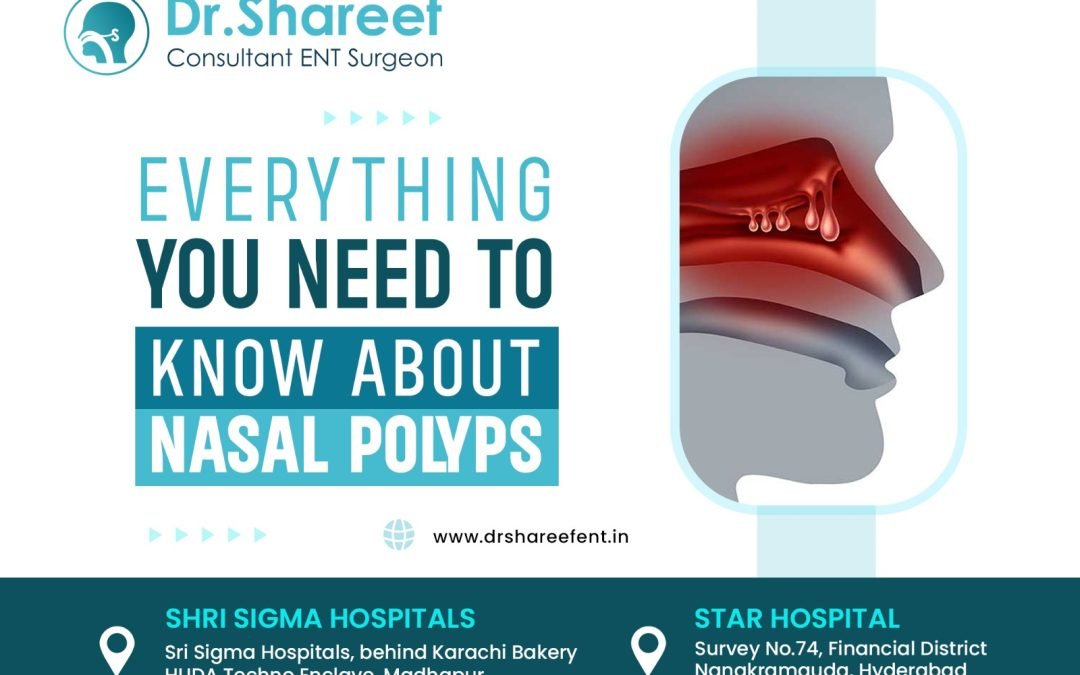Nasal polyps are the non-cancerous growths that form on the nose lining or sinuses. They are soft, painless, and flashy swellings in the nose lining. Nasal polyps vary in size and they can grow like grapes on a stem. They may form either in one nostril or both nostrils. Though nasal polyps are not cancerous, large polyps can lead to breathing issues, infections, and affects smelling ability. Nasal polyps can be treated using medications and surgery.
Does Nasal Polyps Show any Signs?
If you have small nasal polyps, you may not have signs. But as the polyps grow, you may notice the following signs:
- Runny and stuffy nose
- Sneezing
- Poor or no sense of smell
- Headache
- Facial pain
- A feeling of pressure on the face and forehead
- Snoring
- Postnasal drip
- Loss of taste
- Itchiness at eyes
In severe cases of nasal polyps, you may have other signs such as obstructive sleep apnea and double vision.
What Causes Nasal Polyps?
Nobody knows the exact reason for why polyps occur. But nasal polyps can grow due to the swelling and inflammation in the nose due to allergies, asthma, and infections.
However, there are certain risk factors that can increase your chances of developing nasal polyps. The risk factors include:
- Asthma
- Allergic rhinitis
- Aspirin sensitivity
- Vitamin D deficiency
- Cystic fibrosis
- Dental infections
- Chronic sinus infections
- A family history of nasal polyps
Does Nasal Polyps Cause Any Complications?
In some cases, sinus infections due to nasal polyps can lead to serious issues such as:
- Bone infection
- Bone loss
- Abscesses
- Meningitis
How is Nasal Polyps Diagnosed?
To diagnose nasal polyps, the doctor will initially perform a physical examination. During physical examination, the doctor asks you about your medical history, signs or symptoms you are experiencing, etc.
The doctor may also use the following tests for diagnosis:
- Nasal endoscopy: It involves inserting an endoscope with a camera and light into the nose to view the inside of your nose.
- Imaging tests: Imaging tests such as CT scans may be used to know the size and location of the polyps. This helps your doctor to rule out other causes of your blocked nose.
- Allergy tests: Allergy tests help your doctor to know about the allergens that are causing nasal polyps and inflammation. It involves making a small prick in your skin and then various allergens will be deposited. Then the doctor will examine how your immune system is reacting to those allergens.
- Blood tests: Blood tests help to know if there is any condition linked with nasal polyps.
- Cystic fibrosis test: It is performed using your sweat. For this, a chemical is placed on the skin to cause sweat. Then the sweat is checked if it is more salted than other’s sweat.
Treatment Options for Nasal Polyps
The treatment for nasal polyps is based on the severity of the condition. The treatment options include medications and surgery.
Medications cannot cure nasal polyps, but they help to ease the signs. Common medications include:
- Oral steroids
- Steroid nasal sprays for shrinking the polyps and reduce the signs
- Biologic medications to block certain proteins in the body that cause inflammation and thereby reduce swelling and inflammation
- Antibiotics may be prescribed if you have any infection
If medications do not help, then endoscopic surgery can be performed to remove the nasal polyps. Surgery is also preferred in case of larger nasal polyps. Surgery removes the polyps and unblocks the nasal passages. Even if nasal polyps are removed using surgery, they may grow back over time. The doctor will guide you on how frequently they reoccur and how to manage them.
Your Child Have Signs of Nasal Polyps? Meet Dr Shareef for Assistance
Dr Shareef has been working as a consultant ENT surgeon for over 25 years. He has a special interest in Pediatric ENT, Cosmetic ENT Surgeries, Endoscopic sinus surgeries, and more. He is well equipped with all the necessary and high-end OPD instruments like endoscopes, etc. He can handle numerous ENT issues ranging from simple to complex. If you or your loved one experiences nasal polyps signs or any ENT issues, book your appointment Dr Shareef right away.

